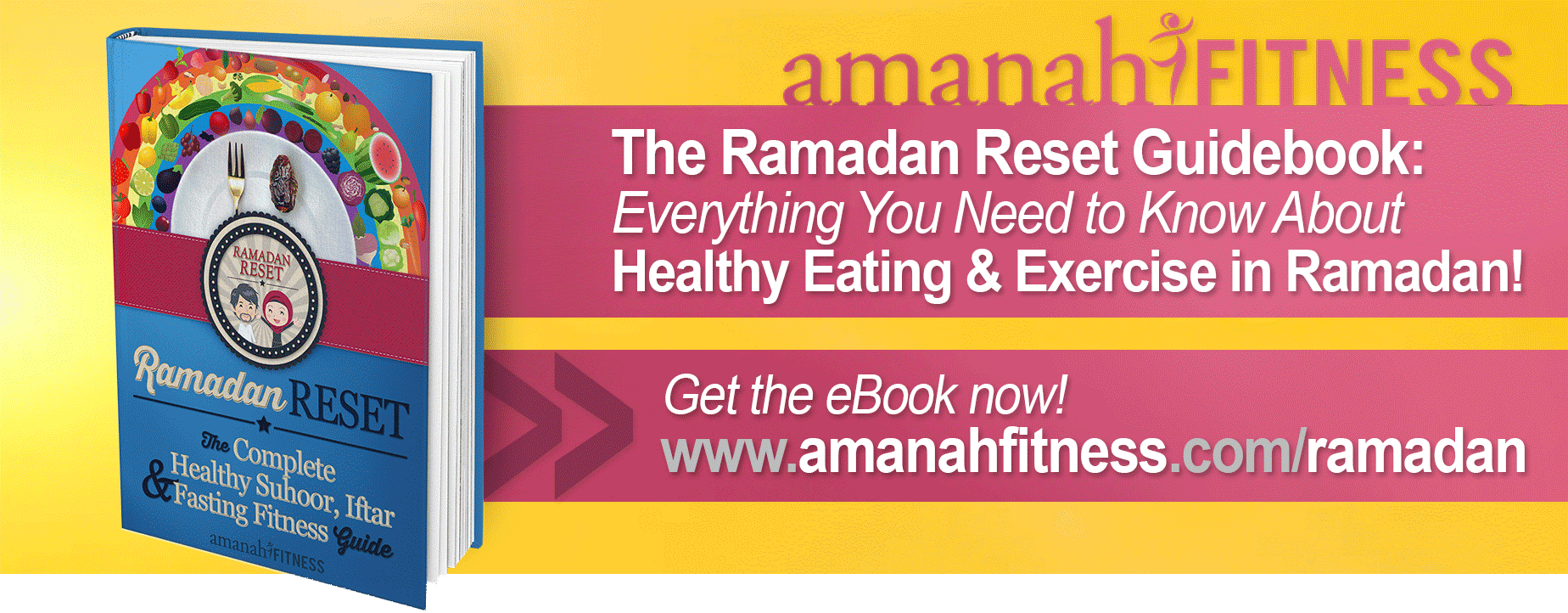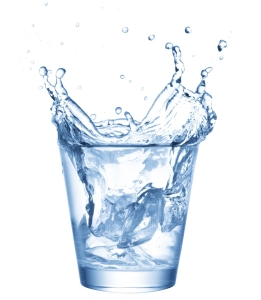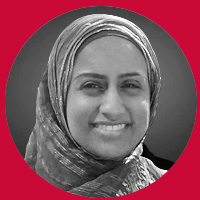
By | Shireen Hakim, RDN
Eating healthy can often seem overwhelming, especially while fasting! Instead of worrying about changing everything, let’s get real simple and answer 5 frequently asked questions that can truly change your life this Ramadan, inshAllah.
1) “I don’t know what to eat! What are some foods that are a MUST-have for iftaar?”
Fluids and fibrous foods are ideal for iftar time. Your body needs to be replenished with fluids after the day without. Besides water, other fluids would be soups, fruits, vegetables, milk, yogurt, and salads. Sugary and caffeinated drinks are definitely not a good source to go to: they will actually make you more thirsty the next day.
Fibrous foods include fruits, vegetables, whole grains (brown breads, brown rice, couscous, quinoa, brown pasta), lentils (daal, haleem).
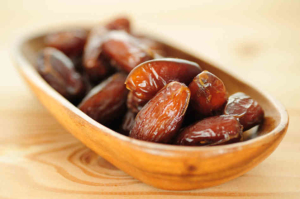 The date: the ideal fruit.
The date: the ideal fruit.
Because of its fibrous content and natural sweetness, dates provide healthy sugars to the body as energy and is absorbed by the body at a timely and useful rate.
Low-fat protein foods also provide energy that is expended over a long period of time: eggs, turkey, fish, tofu, lean chicken, garbonzo beans (chole with yogurt).
2) ” I can’t STOP eating!! Do you have any advice on how to avoid over-eating (gluttony) at iftar time?”
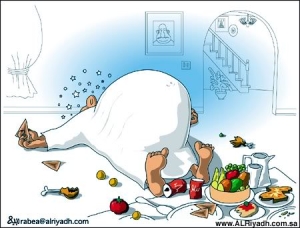 Realize that you do not need to compensate for all the missed meals during the day into one meal of iftar. While fasting, your energy and activity levels are naturally lower, so your nutrition needs are less as well.
Realize that you do not need to compensate for all the missed meals during the day into one meal of iftar. While fasting, your energy and activity levels are naturally lower, so your nutrition needs are less as well.
Therefore, you do not need to eat as much as you normally do.
You have not eaten for the whole day, so your body needs to be gradually eased into the process of eating and digesting food again.
The best thing you can do for yourself is to eat slowly and in small quantities. Eating a lot of food at one sitting will only lead to feelings of fullness, indigestion, fatigue from high blood sugar, and acid reflux.
Eat foods that are good for you and full of nutrients. This way you will be satisfied eating a normal amount of food. These foods are listed above.
3) “I love eating junk at iftar! Are there any foods we should avoid?”
Everything can be enjoyed in moderation. When it is time to eat, it’s natural to want to go for those fried and sugary foods we’ve been dreaming of all day; however, you must beware. Many of these foods that we crave deplete our energy and often times, make us fee SLUGGISH.
Be careful when attending iftar parties: eat the foods you know that are good for you, and avoid the tempting ones.
Avoid/Limit:
#1. Sugary foods– will quickly lead to fatigue and irritability after being eaten (this includes white bread, white rice, chips, cookies, juices, soda, candy). Eat fruits instead of sweets to satisfy your craving. Dilute your juice to decrease the amount of sugar you drink. Try mixing carbonated water with some fresh juice or fruit if you are used to carbonated drinks like sodas.
#2. Fried Foods– Like fried pakora, samosa, dosa, pizza, fast food can cause indigestion and acid reflux. Cut down the amount of oil used in cooking, and switch from frying to baking. Substitute veggies and herbs for flavour to make up for using less oil. Try adding more onions, tomatoes, garlic, ginger, basil, rosemary, sage, vinegar, lemon and you will see the result in the taste.
#3. Stuffing yourself. Take your time. Eat smaller portions and eat slower. Eat more of lean proteins, vegetables, and whole grains instead of fried foods, sugary foods, and white carbohydrates. With carbohydrates, a fistful is a good recommended size. Do not fill your plate with carbohydrates. Fill it up more with lean proteins and veggies.
4) “I can never wake up for suhoor! How important is suhoor while fasting?”
Suhoor is our breakfast during the month of Ramadan. We know that breakfast is the most important meal of the day.
Suhoor is even more important than breakfast, because it is the ONLY meal of the day during the month of Ramadan.
It is your opportunity to provide your body with fuel necessary to last throughout the day.
Skipping breakfast causes us to crave sweets and overeat later on throughout the day. It slows our metabolism and is the number one reason people become overweight. You know how sluggish and grouchy you feel when you skip breakfast? Well,
Skipping suhoor has the same effect, but it is more paramount because you cannot make up the meal during the day.
Your body has no stored fuel to use. The food you ate during iftar and dinner has been digested and utilized. Your body will turn to breaking itself down for energy. It first breaks down muscle, which will lead to fatigue and low energy levels.
5) “Am I drinking enough?? Since we are fasting, it is difficult to drink lots of water. How do I compensate for that?”
The amount of water recommended is based on your height, weight, and energy. You should have 1mL of water per kilocalorie consumed.
On average, below are the MINIMUMS for women & men:
- Women need about 1200-1500 calories a day. So that equals 1200-1500 mL of water a day. 1200mL = 5 8-ounce glasses of water. 1500mL = 6 8-ounce glasses of water
- Men need about 1800-2000 calories a day. That equals 1800-2000mL of water a day.
1800mL= 7-8 8-ounce glasses of water 2000mL= 8 8-ounce glasses of water.
Besides water, you can meet this requirement by consuming water-filled foods such as fruits, vegetables, milk, yogurt, and soup.
Try to aim towards 10 glasses per day to ensure proper hydration despite long, summer fasts!
Take Home Tips:
What are the most IMPORTANT practices a person MUST implement to stay healthy during Ramadan?
- Stay hydrated. And keep water as your main source of fluid (Again, juices, sodas and caffeinated drinks will make you more thirsty). Take a water bottle with you to taraweeh and keep it with you when you’re at home so you remember. Aim for 10 glasses a day (or ~5 water bottles!). Here’s how to do it: 2 cups at iftar, 2 cups after Maghrib, drink from a water bottle at Taraweh, 2 cups after Taraweh before bed, 2 cups at suhoor.
- Be wary of fried foods. Fried foods are the #1 culprit causing Muslims to gain weight during Ramadan. Everyone loves their fried savories in Ramadan, but realize that portion control MUST be implemented to avoid the Ramadan weight gain syndrome! Remember the all-important Rule of One: Only fry ONE of each item for every member of the family. Do NOT make an entire tray… because you will end up eating the whole tray!! Also, please try to be open-minded to alternative cooking methods. Instead of frying your food, bake them! Just lightly spray a pan with Canola oil (and not butter, ghee or vegetable oil). Fried foods, although tempting, should be avoided as much as possible – they have close to zero nutritional value and are a huge source of saturated fat. Baking these traditional items allows you to enjoy them, without all the fat!
- Follow the sunnah and don’t miss out on suhoor. Your body will really feel the difference and you won’t be so tempted to overeat during iftar. Treat suhoor as FUEL and plan the night before to make sure you are eating a good variety of healthy foods at suhoor, to keep you going throughout the day.
- Get educated! Mastering your health in Ramadan can seem difficult, but it doesn’t have to be! Learn everything you need to know about exercise in Ramadan by signing up for our Ramadan Reset eBook: Your Complete Guide to Your HEALTHIEST Ramadan EVER! This 100+ page eBook is an ALL-IN-ONE! It provides the essential information you need to know to truly have a successful Ramadan inshAllah – spiritually AND physically! Find out more here: www.amanahfitness.com/ramadan.
***

